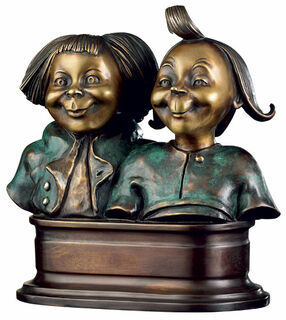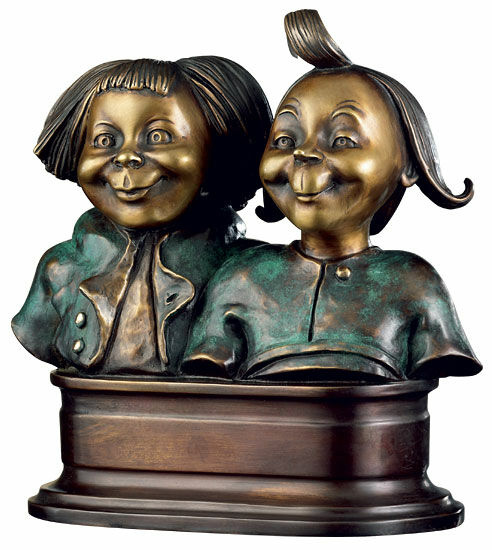Sculpture "Max and Moritz", bonded bronze version
Sculpture "Max and Moritz", bonded bronze version
Quick info
ars mundi sculpture model | bonded bronze | handmade | hand-patinated | -polished | size 19 x 19.5 x 9 cm | weight 3 kg
Detailed description
Sculpture "Max and Moritz", bonded bronze version
ars mundi sculpture model, designed after Wilhelm Busch's humorous drawings from 1865. Edition in polymer bonded bronze. Patinated and polished by hand. Size 19 x 19.5 x 9 cm. Weight 3 kg.
About Wilhelm Busch
1832-1908
The painter, draughtsman and poet Wilhelm Busch became the best-known German artist of his time with humorous picture stories. He is considered the founder of modern caricature. His rhymes and drawings form a central part of German cultural heritage today.
Wilhelm Busch studied in Antwerp, Munich and Düsseldorf. In his own words, the artist spent the best time of his life in 1841-46 as a student in Ebergötzen, where he hatched many pranks with the miller's son, Erich Bachmann. This friendship and shared childhood memories gave rise to his famous story: "Max and Moritz: A Story of Seven Boyish Pranks", probably the most translated and read children's book in the world...
Sculptural representation of person's head and shoulders.
Bronze powder is polymer-bonded. Special polishing and patination techniques give the surface of the casting an appearance similar to the bronze.
A plastic work of sculptural art made of wood, stone, ivory, bronze or other metals.
While sculptures from wood, ivory or stone are made directly from the block of material, in bronze casting a working model is prepared at first. Usually, it is made of clay or other easily mouldable materials.
The prime time of sculpture after the Greek and Roman antiquity was the Renaissance. Impressionism gave a new impulse to the sculptural arts. Contemporary artists such as Jorg Immendorf, Andora, and Markus Lupertz also enriched sculptures with outstanding works.


